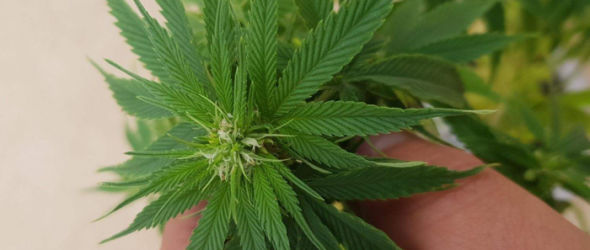Late last year, when Anastasios Nomikos discovered Australian Capital Territory residents would soon be allowed to grow cannabis for personal use, he began planning his move up from Melbourne.
“I messaged a couple of my friends who were looking for housemates in Canberra and I said, ‘Hey guys, can I please move up?'” he told The Drum.
“It’s honestly 95 per cent of the reason I moved there.”
The ACT’s laws allow possession of up to 50 grams of cannabis per person, and a maximum of four plants per household.

Mr Nomikos had never grown the plant before, but what he lacked in experience he made up for in enthusiasm.
But one afternoon, shortly before he was due to harvest his plant for the first time, he came home from work to find his prized possession missing.

“I went outside and all I saw was a trail of dirt. That was heartbreaking.”
He was disappointed, but not surprised.
“Someone’s always going to find a way, especially if it’s a very nice, healthy looking plant. They can peek over fences and everything.”
Difficulties complying with the law
The requirement that plants be grown outdoors, where they are a target for thieves, is one of a number of complaints cannabis users have with the ACT laws.
“You can grow cannabis, but it’s illegal to buy the seeds,” says long-time cannabis legalisation advocate Jason Foster.
“You can grow four cannabis plants [per household] but you can only have 50 grams, which is less than what one plant will produce.”
The complaints are nothing new to ACT Labor MLA Michael Pettersson, who introduced the legislation in 2018.

“The model we’ve got in place in the ACT isn’t perfect. It addresses possession but it doesn’t address supply,” he says.
As well as being restricted by federal law, the ACT legislation conflicts directly with Commonwealth cultivation and possession laws.
In October last year Attorney-General Christian Porter warned the Commonwealth law “[was] still valid law in the ACT”, but so far no legal challenge has been mounted.
“The time for that has come and gone,” says Mr Pettersson.
“There was a lot of sabre-rattling at the time, but ultimately it came to nothing.”
ACT Police data obtained by The Drum shows there has not been any significant change to detections of THC — the main psychoactive compound in cannabis — in roadside drug tests since the laws came into force on January 31.
Support for legalisation growing
Cannabis remains the world’s most popular illicit drug.
According to a 2019 Australian Institute of Health and Welfare survey, nearly 11 per cent of people over 14 had used it in the previous year, and an increasing number of people believe it should be made legal.
Medicinal cannabis was legalised at the federal level in February 2016.
At the time, the AIHW reported that 85 per cent of Australians were in favour of the drug being used in medical settings.
Last week cannabis stocks in Australia surged after the Therapeutic Goods Administration announced it would re-classify CBD oil, paving the way for it to be made available over the counter.
CBD oil — or ‘cannabidiol’ — is derived from cannabis and often used for medicinal purposes. Unlike cannabis products that include THC, it does not create a ‘high’ effect.
Following in America’s footsteps
In the United States, recreational cannabis is legal in 11 states, and Democratic vice-presidential nominee Kamala Harris has indicated her support for wholesale decriminalisation.
There and in Canada, legalisation has generated hundreds of millions of dollars in state revenue and reduced drug-related arrests.

But experts warn commercialisation could result in profits being put before public health — reminiscent of the early days of the alcohol and tobacco industries.
“[In Australia] we’ve spent decades rolling back the impact of the tobacco industry and the alcohol industry … from a public health point of view the evidence is clear that we’d want to be pretty wary about going down that road.”
New Zealanders prepare to vote
Next month New Zealanders will head to the polls to vote in a non-binding referendum on whether to legalise recreational cannabis for people aged 20 and over.
Prime Minister Jacinda Ardern has refused to say which way she plans to vote.
A report commissioned by the New Zealand Department of Justice predicts that if the drug is made legal there will be an initial spike in both consumption and cannabis-related hospitalisations, which will subsequently recede.
It also predicts excise taxes will raise $NZ640 million per year for the government.
“There are countries out there where it’s been legal for decades, and the sky didn’t fall down,” says Jason Foster.
Closer to home, and the events of 2020 have seen Anastasios Nomikos return to Melbourne — but he says it’s not a permanent move.
“I have every intention of moving back to Canberra,” he said.
The Drum airs weeknights on ABC and News Channel.


